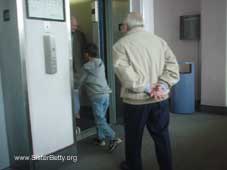| 4
February 2002 (Link
to this entry) (Comment)
Yesterday was warm and beautiful. I had
an appointment for some tattoo work at a South of Market studio and I decided
to walk home afterwards. I wandered down some streets I’ve never
been down before, ending up on Market Street next to some antique shops.
I learned to type on a manual typewriter – the
kind that you have to push the platen back and forth and use little bits
of correction tape to fix errors. An old boyfriend used to have such
a typewriter in his kitchen and his guests would type little bits of poetry
or silly phrases. I’ve been thinking about getting one to use to
compose fiction with, I fancy that doing so will be easier than using a
computer. I spied such a machine in the front of an antique shop.

It turned out the typewriter was too old and
worn to be of service but a row of old clocks on the wall really caught
my attention.
On the mantle in the house where I grew up sat
an electric clock. It was a wedding gift to my parents from someone
I never met. It was a simple affair with Westminster bells; I learned
to tell time by their chiming. The back of the clock had a door and
you could open it to watch the machinery inside. It smelled of oil
and ozone. The electric motor and turning gears emitted a constant
low growl. If you watched long enough, the tiny hammers would rise
and fall on the chimes in perfect order. I vaguely remember looking
inside the clock was not encouraged, but it was a magical thing and I waited
for opportunities to peer inside of it. To this day I could draw
you a picture of the inside of that clock. Of everything my parents
own, it’s the one thing that I’d like to have when they pass.
Two years ago, on a visit to my parents, they
announced they had asked all their children – there are five of us – to
go through the house and put a tag on anything they wanted when my parents
die. My brothers and sister had been given eight months head start
and the clock was already claimed.
I hadn’t thought about that clock in a long time,
but the row of clocks in the antique store brought it to mind. There
were many ornate clocks on the shelf, some with marble, some with brass,
all showing the character of age, but the longer I looked the more I wanted
one like that simple, plain electric clock that chimed every fifteen minutes
for my entire childhood.
I only felt this way about one other object in
my life – a small, purple bottle shaped like a violin that sat in the window
of my grandmother’s house. I was in the Navy when she died and that
bottle disappeared. I never told anyone how much I wanted it, and
I still have a perfect picture of it in my mind, resting on the window
sill, the sun shining through it, reflecting off the glass and turning
the sill violet.
I left the store having decided I’d keep looking
for a clock just like that one. Someday, I reasoned, I’d find it.
But having written this, I think I may call my brother and talk to him.
He might understand and let me have the clock. He might not, but
maybe we can work out a visitation schedule – summers with me, winters
with him.
It’s odd how some things come to carry so much
memory and emotion; little bits of the past, artifacts of people we were
or people we loved. I’ve known some people who are roving museums
of the past, their lives filled with articles that have no value to anyone
but them. I don’t completely understand the phenomena. But
then, I step inside an antique store and remember carefully placing a clock
back on the shelf, back in the same place it came from, careful to disturb
no dust or cobweb, so my mother wouldn’t know I’d been peering inside again.
5 February
2002 (Link
to this entry) (Comment)
There are four things to talk about today:
Diane Whipple, big waves, glass bottles and beautiful women. If you
are only interested in beautiful women, then skip to the end.
First, in checking the web log today, I discovered
a large number of people are visiting this site after having searched for
“Diane Whipple”. If you are one of them, you can find that entry here.
This discovery motivated me to move the search engine form from the bottom
of the screen to the top so people can find things a bit easier.
I don’t particularly like it in the new location, but it will stay there
for now. Suggestions?
On my way to work today, the sun was shining and
there was an off shore flow. The waves rolling in on the Pacific
were perfect, each one held back a few seconds by the wind and then crashing
into the one before. Rather than go directly to the office, I went
to the beach and the fishing pier. I suspect you’ll see many pictures
from today in future entries, but here is one. As a special bonus,
clicking the photo today will allow you to see video of the waves.
The waves don’t translate perfectly to digital video, so allow your imagination
to embellish as you will.

Yesterday, having written and posted about my
grandmother’s violin-shaped bottle, I was suddenly struck with the realization
that the bottle was green, not purple. I pondered this for a few
moments and I realized that my mind recalled the bottle both ways.
I could recall it being green and I could recall it being purple.
In the years since I last saw it, somehow this piece of the memory has
changed, lost its original focus and my mind fills in the spaces of the
image that no longer exist. It made me sad at first that so treasured
a memory had lost part of its authenticity.
What I came to realize is that the bottle was
completely unimportant. It was simply an object with a surface porous
enough to capture all the emotion that was my grandmother’s house.
Grandma was my father’s mother, and my father was the only one of her children
to produce offspring. She lived in Michigan; we lived in Arizona.
Lacking funds, we rarely visited. In my life I saw her house perhaps
five times. The bottle sat in the dining room, the kind of formal
dining room people used to have. Next to the dining room was the
kitchen where my grandmother would bake batch after batch of cookies for
us. She had so many different recipes and my favorite was a chocolate
cookie, topped with a marshmallow, and topped yet again with chocolate
sauce and nuts. Every time we visited she would send us home with
an extra suitcase filled solely with cookies. Grandma was diabetic,
so she never was able to eat those cookies, but I think she loved that
we did. Grandma taught me to swear in Dutch and how to sneak candy
into church. My grandmother died while I was in boot camp.
The bottle disappeared, so did the recipes for her cookies, but I still
recall what it was like sitting in her kitchen and having tea with orange
juice.
Regarding other beautiful women....
I sold my television many months ago. If
you’re the kind of person who is nervous talking about God, then you may
laugh when I say that I felt led by God to get rid of it. It was
a bit of an adjustment not to have that instant escape from the world.
With time, I felt as if a toxin had been removed from my life, that I had
removed myself from the mainstream in a significant fashion. Not
having a television has one significant downside: it makes conversation
with the average person very difficult when you can’t reference the current
popular show or event. Television gives us a common language to avoid
dialogue about more substantial subjects.
Having lived without television for several months,
I was in the airport one day taking a friend to his plane. The waiting
area was surrounded by televisions, their noise piped through overhead
speakers. It was impossible to avoid. My attention was caught
by an interviewer asking a cover-model: “So what do you think is
sexy this year?”
I thought about this for several weeks afterwards.
It’s an odd idea, really, that what is sexy would change from year to year.
Human beings don’t change that much, we’re pretty much the same creatures
we’ve been for thousands of years: two eyes, two ears, legs, breasts,
penises and vaginas. Some are thinner, fatter, shorter, taller.
This question, “What do you think is sexy this year?” really has nothing
to do with us as humans. It only has to do with what we wrap ourselves
in, the bits and pieces of cloth that we sew together to cover the bodies
most of us have some shame about. In this endless pursuit of sexiness,
we lose track of what really constitutes attractiveness.
I’ve been surrounded by beautiful women for much
of the past year. They are women of such beauty that I sometimes
consider
how wonderful it would be to have a life with them, what it would be like
to have a family and raise children with them. Most of these women
wear no makeup and dress very plainly. They are the women at the
Quaker Meeting House. Women have held roles of importance in the
Quaker tradition since it was founded, and their important remains vital
to this day – I’d argue that it is one place in western society where men
and women truly stand on equal ground. The Quaker women have a quiet
elegance, born of simplicity of lifestyle and spirit that rises up from
a place deep within them and shines through their pores.
There is a deep and often unconsidered problem
with a society that places such heavy weight on our outward appearance.
It encourages us to hate who we are and aspire to be something we are not.
Riding home on the subway today, I looked at the people around me.
They were average people, unremarkable in nearly every way. As the
train pulled into a stop, through the windows peered ads filled with amazingly
perfect humans that looked nothing like the people surrounding me.
The ads said “this is what you should be” and we flock to buy the products,
even though we know they will fail to make us into the image of the poster.
So, my answer to the question “What do you think
is sexy this year?” is very simple. It is that which has been sexy
from the beginning of time. It is the sexiness given to us by our
creator, the attractiveness that comes from an understanding we, and those
around us, are children of the divine and that our existence is no less
a miracle than any other contained in history. We emerge from our
mothers as beautiful and sexy creatures, but we conspire to make each other
ugly. And we often spend the rest of our lives trying to feel beautiful
again.
6 February
2002 (Link
to this entry) (Comment)
I make my living as an executive coach, consultant
and trainer. Much of my work is filled with making people understand
it is okay to be human. It’s amazing how much judgment we carry around
inside ourselves. I carry it too, so I have first hand experience
in addition to work experience.
There are days when I’d like to write about my
clients, but to do so would violate the integrity of our relationship.
Here is a central lesson about life: most of our suffering, most
of our sadness both at work and at home can be resolved to a single point
- there isn’t enough love in our lives.

Love is like food, water and air. It’s
essential to our survival and thriving as human beings. Years ago,
I knew a doctor who had spent much of the 1960s and 1970s taking care of
orphaned babies in Africa. The orphanage had an extremely high mortality
rate, babies simply turned their faces to the wall and died. The
doctor ordered the staff to begin picking the children up, cradling them
and holding them. Each child was to receive as much time with an
adult as frequently as possible. Children stopped dying and started
living.
As adults, we still need that love. Unfortunately,
our own defenses and the toxins of our culture stand in the way of our
giving or receiving it. In our own way, we turn our faces to the
wall and over time bits of us die off. The results of this run throughout
our society: depression, anxiety, divorce, obesity, violent crime.
Stop by your local prison and ask an inmate about their life, I doubt you’ll
find a story of love. When I encounter people who resist this concept,
they are often suffering great depravation, and admitting this point would
point to painfully at their own condition. People who experience
real love never disagree with this argument.
Human beings have a remarkable ability to generate
colossal amounts of love. People who are really good at it often
change the world. I believe giving and receiving love is a bit like
meditation – we grow better through practice and consistent application.
Over time, it becomes such an integral part of our being that we no longer
make a conscious effort, instead it flows from us without reservation.
I also believe that love is a spiritual practice similar to meditation.
What keeps you from loving others? What
keeps you from accepting love from others? What would your life be
like if you improved, even a little, in each of these areas? How
might you make such improvement?
7 February
2002 (Link
to this entry) (Comment)
Tonight is my monthly
bingo game, so I’ll be busy planning and running the event. With
little time to write today, I thought I’d share a quote instead:

“Our Gracious Creator cares and provides for
all his creatures. His tender mercies are over all his works, and as far
as his love influences our minds, so far we become interested in his workmanship
and feel a desire to take hold of every opportunity to lessen the distresses
of the afflicted and increase the happiness of the creation. Here we have
the prospect of one common interest...to turn all that we possess into
the channel of universal love becomes the business of our lives.”-
John Woolman (1720-1772)
8 February
2002 (Link
to this entry) (Comment)
There won’t be much writing today. A giant
stained glass window fell on my hand at the bingo hall last night, doing
a fair bit of damage to one of my fingers. It’s currently swollen
to about twice it’s normal size, which makes typing both difficult and
uncomfortable. So, in the interim, please take a tour of past
scratchings.
Of course, I can still cut and paste one of my
favorite quotes which seems appropriate:
“Healing - the healing of a cut or wound of
any kind is an experience of personal miracle. The healing moves
from inside out and takes as long as it needs to knit the rupture together.
It may take days or weeks...that is why we do not see it as a miracle.
But it is a job of inner work doing its work with patience. We often
overlook the mystical work of own bodies.” - Robert W. Edwards
8 February 2002 - Several hours
later
Well, it’s a fractured bone – now fitted in a
big splint on the fourth finger that makes typing very, very difficult.
There also appears to be some nerve damage that may result in a permanent
loss of sensitivity in the fingertip. Considering the size and weight
of the window, pretty minor damage really. Goodness knows people
will really think I’m butch when I explain the splint is from playing bingo.
It took five minutes to type this, so long scratchings will be rare for
the next few weeks. I suppose this is a good excuse to write less
and read more.
10 February (Link
to this entry) (Comment)
I was the youngest of four boys. I sometimes
wonder if by the time I arrived my parents had experienced enough of raising
children and figured I’d do okay on my own. Watching my older brothers,
I saw how much my parents loved them. I wished they would love me
in the same way, but somehow I disappeared into the background. My
father spent endless hours teaching my brothers to work in his shop, to
build model rockets, and constructed treehouses that were the envy of the
neighborhood. I was always too young to participate, and by the time
I grew old enough, my father had no interest. I was an immensely
lonely child. When I graduated high school, no one asked when the
graduation ceremony would be and no one commented that I didn’t attend.

Three years after I left home, I told my parents
I was queer. My mother cried and said nothing. My father said
many things, none of them I want to write. Shortly thereafter we
stopped speaking altogether and we didn’t see each other or talk again
for five years.
My parents moved to a city just a few hours away.
They frequently travel to see their other children in more distant cities.
Sometimes they come to San Francisco, but only once did they call to say
they were in town and for too short a time to see me. I’ve visited
them for a holiday; we spent awkward hours talking about the weather and
my father’s aversion to national health care. I drove down several
months ago after my mother fell and broke her hip. Walking to my
car in the parking lot of the recovery hospital, my father said: “Well,
we have a lot of history, but we love you.” Although this sounds
more bitter than I intend, the comment held the sincerity of Marilyn Chambers
crying “yeah baby” for the video camera.
I have a friend who talks to his mother nearly
every day. They talk about his life and her life, nothing is sacred
they talk about it all. She tells him constantly how much she loves
him and he tells her the same. I hate him like I hate every other
queer person whose parents love them and march in parades and call on birthdays.
I don’t wear jealousy well, but I keep it tucked nicely inside.
This is the central sadness of my life, really.
In all the joy I have in my life, there is always this little corner where
part of me wishes that my mother and father could love me the way I watched
them love their other children; a lifetime of watching the parade from
the curb, wanting to join in and never being allowed. It’s that little
kid who says, “Hey, remember me? I’m here, too.”
I used to be angry, anger turned to rage, rage
burned until I had no more energy and then came forgiveness. Forgiveness
removed the anger but didn’t take away the sadness. I can see my
parents clearly, who they are, where they came from, and how things worked
out at as they did. Sometimes I feel no emotion at all, and in other
moments I feel a deep sense of grief.
My mother celebrates her 65th birthday in two
weeks and my father sent a request that I pen a note telling her how special
she is to me. I sat with this for a not insignificant period of time
and I still have no answer. I feel nothing, no need to respond, no
need to write. What I want to write is this: “I loved you,
but did you ever love me? I turned out pretty good, you know.
Someday I hope you’ll notice or even just come to visit.” Somehow
I don’t think I can find a Hallmark card with that sentiment.
11 February
2002 (Link
to this entry) (Comment)
I didn’t realize how much the last entry needed
to be written until it was done. There was a fair bit of sadness
that needed to fly around the room.
I believe less and less in coincidence as I get
older. Saturday evening I allowed the grief to come out and Sunday
was filled with a generous dose of love. The morning was spent with
the Quakers, about the most generous or compassionate group of people you’ll
ever find. In the afternoon, I ran into an old acquaintance who now
lives in Vermont. He was back for a visit and brought much good news.
Eating dinner by myself in a restaurant, an old lover appeared from the
ether and we had a good laugh together. I ended the day feeling wrapped
in the love and warmth that comes from possessing a life filled with good
people.

Later, laying in the dark and drifting to sleep,
I was awakened by the buzzing of a mosquito around my ear. I waved
it away and pulled the sheets closer around my head. Moments later
it returned, the annoying buzz a precursor to a nasty bite. I waved
it away again. It returned again with its high-pitched whine.
Irritated, I switched on the light and saw the noisy offender on the wall.
I took a book from the nightstand and smashed the mosquito. I laughed
this morning when I saw the title of the book was “Encounter with Silence”.
12 February
2002 (Link
to this entry) (Comment)
I spent three hours on the telephone today attempting
to resolve an issue with Pacific Bell that has plagued our business since
last summer. This is just one of numerous such calls and the situation
is still not resolved. The summary of the situation: Pacific
Bell mixed up my business telephone bill with another company with a similar
name and the nightmare has yet to be sorted out. Big companies drive
me crazy, especially when I don’t really have any choice other than to
use their services. This situation is so tied in knots that it’s
likely we’ll end up filing complaints with the government and perhaps taking
Pacific Bell to court. I cringe at that thought. I generally
don’t believe in suing people or companies, and having been a witness in
a courtroom I don’t want to subject myself to our legal system.

It’s generally accepted in our culture that big
corporations can abuse their customers with no consequence. I prefer
to do business with little companies where I know the staff by first name
and a real person answers the telephone. I willingly pay a little
extra to work with smaller firms, in the end it gets paid back in customer
service, direct access and friendly encounters.
I wonder about the sustainability of any system
that places profits over the needs of people. In popular dialogue,
economic growth is supposed to benefit our society. But, increasing
profit often requires action that works to the detriment of humans, whether
it be environmental, interpersonal or otherwise. What value is economic
wealth when by every other measure the society is impoverished?
On an entirely different subject, the San Francisco
Chronicle ran a story recently on the declining
number of nuns in the Catholic Church. Some local activists,
including at least one person I consider a close acquaintance, seized upon
this to point fingers at the Catholics and make some rather disparaging
comments about the nuns. Whatever feelings I may have about some
of the positions held by the Catholic Church, I have the utmost respect
for the women who have undertaken this noble profession. For decades,
nuns have run hospitals, fed the poor, housed the homeless, lobbied for
corporate responsibility and economic justice and provided models of selfless
dedication to community. Name some people who have been heroes for
our time and Mother Theresa, a nun, will rank near the top. Unlike
priests, nuns often must finance their own convents, medical care and retirement.
Dedicated one’s life to spiritual and community service is an admirable
calling.
In my childhood, one of the most loving people
in my live was a Catholic nun named Sister Margarita Jimenez. She
drove a giant motor home and had what my father referred to as a “lead
foot”. Somehow she always managed to charm her way out of speeding
tickets. I always felt loved when Sister Margarita was around.
So, a special thanks to all the women who have
given, and give, their lives to service of others in this world, whether
you are a nun or not.
14 February
2002 (Link
to this entry) (Comment)
I’ve been unable to write a cohesive entry for
two days. I have plenty to start with, but it always turns to mush
about two paragraphs down and coming up with a closing paragraph rests
outside of reality. I’m going to steal a little bit from David and just rattle off the various things I’ve been thinking about.
Maybe someday I’ll return to write more about them.
- I’m uneasy about the John Walker Lindh trial.
I suspect this legal experiment is less about fact and truth and more about
emotion.
- John Spann is not a hero and the CIA is debatably
one of the most contemptible organizations this country has ever fashioned.
- As wicked and loathsome as Milosevic may be, he’s
right. The international tribunal is biased and legally questionable.
If we were truly interested in international justice, Henry Kissinger and
many other American diplomats would be safely behind bars. The arms
of international justice are just short enough not to reach all the way
across the Atlantic.
- George Bush is cloaking more and more of the government’s
operations in secrecy. Very few people seem troubled by this.
Receiving an unexpected call from a friend who
has a spare ticket to a show starring Ann-Margaret is an unexpected surprise.
15 February 2002 (Link
to this entry) (Comment)
I decided it was time to let go of several old
projects. I held on to them long enough.

I worked for a private investment bank when I
first moved to San Francisco. I lacked sufficient work to keep me
engaged, so I fashioned my
first website. It became a successful effort and for a time generated
revenue and profit. I very nearly lost a job when a former employer
learned about this site; he didn’t approve of the ideas it contains.
I lost interest in the site over a year ago but with the traffic the site
receives, I couldn’t bring myself to shut it down. So, I worked with
a friend to automate the content and the site runs now without much supervision.
Strangely, the changes in the site have increased traffic more than ten
percent. I’m hoping someone will come along and offer to buy the
site from me. Until then, it operates on auto-pilot in cyberspace.
If you have some spare cash and want an
established site with traffic of over 25,000 visitors a month, let
me know.
I’m stepping down as the webmaster for the Sisters’
website, too. Sister Hedra and I have run the site for nearly
three years. It’s time to let someone else do this work.
I’m also putting this
site into the guillotine. It was an idea that I never took the
time to fully develop.
I find it curious how things that don’t exist
in the physical world can have such weight.
I’m turning my attention to new projects:
I have at least one book to write and one foreign language to learn.
I want to start painting again and learn to play the piano. By the
end of this year, I will have accomplished two of these things. Oh,
and I need to take a writing class, too. I’m sure you’ve noticed
my grammar and punctuation skills could use a little work.
There is a time to gather stones and a time to
cast them away. If you see me standing next to the ocean and skipping
rocks, you’ll know they’re just recycled bits of the past being cleared
away to make way for the future.
16 February
2002 (Link
to this entry) (Comment)
Despite the threat of rain, the Castro was filled
with hordes of people today. The intersection of the International
Bear Rendezvous, the Imperial Court elections, the impending local elections
and President’s Day Weekend brought an eclectic mix of people to the street.
Drag queens stood on street corners with bull horns, bears wandered through
stores and congregated outside coffee houses, political activists waived
signs and banners and tourists watched the entire melee with amusement.

San Francisco lost a lot of its artists and political
activists in the last few years. Rising rents and evictions were
a prime reason for the exodus. It was a loss that you could feel,
like an elderly loved one slowly losing precious memories of the past.
It felt like some of that energy returned today,
borne on the shoulders of people who have for too long been held indoors
by rain and cold weather. Perhaps I’m just feeling the end of winter
and the beginning of spring. More predictable than robins, the first
sighting of a drag queen in daylight must portend good things to come.
16 February 2002 - Moments Later
Clarification about yesterday's
entry: I'm not closing SisterBetty.org. You can see the
other sites I refer to by clicking on their links. Thanks to everyone
who sent emails and asked!
19 February
2002 (Link
to this entry) (Comment)
Richard Nixon resigned his presidency after he
was linked with criminal activities, some of which took place at the Watergate
Hotel. Since then the word “Watergate” has become pseudonymous with
corruption, obfuscation and scandal. In popular culture, adding the
suffix “gate” to any word implies the parties involved acted with intent
to deceive and that once uncovered, the magnitude of the action will be
outrageous.

Unfortunately, nearly every new scandal rapidly
becomes dubbed “gate” and few, if any, live up to the insinuation implied
by the nomenclature. As our popular culture adds more and more “gates”
from Whitewatergate to Lewinskygate and perhaps even Enrongate, the importance
and collective comprehension of the original Watergate scandal drifts into
a sea of misunderstanding, half truths and distorted historical perspective.
This jargon is a result of a certain cultural
laziness, the desire to understand in a superficial way, avoiding the difficult
questions and thought required to reasonably respond to a situation.
We expect very little from our media, and they deliver exactly what we
expect. Instead of asking the difficult questions that would create
a truly informed citizenry, the news media drives to entertain us, to keep
us watching long enough for the next commercial break, reading past the
next full page ad or clicking past a few more banners. In our drive
to be entertained, such emotional phrases like “Lewinskygate” or “Mother
of all [insert word here]” tease us with promises of dark, hidden secrets
like stained dresses and hidden microphones where none may exist or if
they do exist, their relevance is questionable at best. Our hope
for such excitement keeps us from looking at the broader and more important
questions that face us as individuals and as a society.
This isn’t new criticism, people have voiced similar
trepidation for many years. However, as the United States pursues
a war with no formal declaration, no discernable boundaries, governed by
decisions made in secret and held fast from public view, we need to have
representatives both in the public and news media who can and do ask the
difficult, probing and comprehensive questions that lay bare the truth
of the situation. If we are the “beacon of light and freedom” for
the rest of the world, then how do overreaching secrecy, deception and
covert activities fit into this ideal? Is our government still a
government of the people or has it become so detached to no longer fulfill
this ideal? And if so, do we not have the right to demand a return
of our control or an end of the government in its current form?
20 February
2002 (Link
to this entry) (Comment)
Complaining about spam is a popular internet pastime. If you have an email box, chances
are you’ve received at least some measure of spam, from the innocuous endless
circulation of jokes to the increasingly vile HTML porno emails filled
with pictures of things you might not want to see with your morning cup
of coffee.

There is a certain powerlessness we experience
with spam, it invades our psychic space and we lack the resources to effectively
put an end to it. Even so, I often find the level of anger and outrage
over spam to be disproportionate to the real impact. A stroke of
the delete key banishes it from our domain and filtering software can often
eliminate much of it before it arrives on our desktops.
Every week I receive several deliveries of real-world
spam from the post office. Mass mailings from supermarkets, stores
and insurance companies, catalogs and circulars that I never requested
appear in my mailbox. The mail I really want is often mangled and
smashed among the pages of the stuff I don’t. Unlike electronic spam,
this postal box mess creates real waste. Thousands of tons of paper
are used to create it, and thousands of tons of waste are generated by
its disposal.
Once I tried to stop the real-world spam that
accumulates in my real-world mailbox. I found the telephone number
for Advo, one of the largest direct-mail companies and the company that
most frequently sends me reams of paper I have no interest in. I
politely asked for them to stop sending me their unsolicited spam.
I was told, in relative terms, that it wasn’t possible.
I also recently learned that the US Postal Service
sells your address information to marketers when you fill out a change-of-address
card, something I’ve done four times since moving to this city. And
watch out if you ever buy a house – the volume of second mortgage offers,
refinancing deals and plumber advertisements will require you add a second
room to handle the mail sorting person you have to hire.
Both electronic and real world spam are the byproducts
of a “free market” system that encourages corporations and people to create
wealth at any cost and without regard for the people impacted by their
efforts. If the percentage of responses I get to any mass mailing
generate sufficient profit, then the waste, anger or ill feelings I create
in others is immaterial.
As we feel angry with those who fill our real
world or virtual mailboxes with irksome solicitations, we have to consider
the larger questions. Do we value the society as it has become and
therefore endure the symptoms of the pathology we choose to be part of?
Or do we want to live in a different kind of society? If so, how
do we create it?
21 February
2002 (Link
to this entry) (Comment)
The Stonewall Riots are regarded as the start
of the gay liberation movement, a moment when queers tired of police raids
and gay bashing stood up and fought back. On June 27, 1969, when
I was less than a month old, Sylvia Rivera, a drag queen, threw the first
bottle that started the riot. She died Tuesday at the age of 50.

“In 1969, the night of the Stonewall riot, was
a very hot, muggy night. We were in the Stonewall [bar] and the lights
came on. We all stopped dancing. The police came in. They had gotten their
payoff earlier in the week. But Inspector Pine came in - him and his morals
squad - to spend more of the government's money.
“We were led out of the bar and they cattled us
all up against the police vans. The cops pushed us up against the grates
and the fences. People started throwing pennies, nickels, and quarters
at the cops. And then the bottles started. And then we finally had
the morals squad barricaded in the Stonewall building, because they were
actually afraid of us at that time. They didn't know we were going to react
that way.
“We were not taking any more of this shit. We
had done so much for other movements. It was time.” –
Sylvia Rivera, July 2, 1998 Workers World News.
Sylvia Rivera went on to create a safe house for
homeless queer youth. It lasted three years but failed after Sylvia
became addicted to drugs.
“That's how I ended up homeless. So I moved to
a pier in the West Village. That first winter was one of the worst, with
all the snow and everything, but we survived. I was the typical mother
to all the children living out there -- everybody came to Sylvia when they
needed advice or comfort. I guess it comes from not having a mother or
not having any love when you were a child and always being told that no
one wanted you. When I see someone that's alone, and the person is hurting
and they need some comfort, my heart opens up. I can't say no if they need
a little help. I lived on the pier for about a year and a half. Now I live
in Transie House in Brooklyn.” – Sylvia Rivera, June 27,
1999, New York Magazine.
In her last years, Sylvia ran the Food Pantry
program for Metropolitan Community Church of New York.
“I am proud of myself as being there that night.
If I had lost that moment, I would have been kind of hurt because that's
when I saw the world change for me and my people.
“Of course, we still got a long way ahead of us.” –
Sylvia Rivera, July 2, 1998 Workers World News.
Change often comes from the efforts of the most
marginalized corners and crevices of our society. As years pass,
what was once radical often becomes mainstream, and the voices that started
a movement get washed away under the waves.
Sylvia, may the arms of the Divine hold you close
and welcome you home. You are a child of God. Thank you for
the gifts you left for those who came after you, a generous gift for many
who will never know your name.
22 February
2002 (Link
to this entry) (Comment)
It is an amazingly beautiful day. The weather
just barely calls for short sleeves, the air is clean with just a touch
of moisture. My office sits on the side of a hill, the ocean below
and the crest of the high hill above. Most of the hill is a state
park, grown thick with tough green bushes and grass. Almost every
day you can spot a herd of deer grazing on the far hillside. It looks
like there are three fawns this year, but it’s difficult to tell.
There are coyotes, too. Sometimes they wander by the office windows,
curious and sleek.

My new apartment overlooks a hidden garden, protected
from the city by other buildings. The frogs have been croaking all
night, it is a wonderful sound. I opened the sliding glass door to
the fire escape and stood brushing my teeth, listening to the frogs and
feeling the morning air. One of my cats tentatively sniffed the air
and carefully poked her head beyond the open door. The other cat
ran deep into the interior of the house, fearful of the influx of new air
and odors. Nearly all of their short lives were spent on the tenth
floor of a high rise building where glass defined the boundary of their
world. Now, the glass removed, they struggle to grasp the concept
they can move beyond it. One cat carefully sniffs, not going too
far, the other runs away entirely.
I once heard a story of an experiment where a
piranha was placed in an aquarium with a goldfish. A glass partition
separated the two fish. When the piranha went to attack the goldfish,
it slammed into the glass. After some time, the glass was removed,
but the piranha never went beyond where it had been. It would swim
right up to the edge and never beyond, allowing the goldfish to live in
a protected world that no longer rightly existed.
I think as humans we do the same thing.
Once we have formulated our idea of how the world exists, we seldom move
beyond that formulation. Our mental boundaries become boxes in which
we spend our existence. We feel an assured safety, a comfort, within
those boundaries; we know what lays inside, the territory we inhabit.
If evidence arises that indicates the walls of our cage are uncertain or
non-existent, we often struggle to negate the input, preferring to stay
in that place of great comfort.
Whether or not staying within the boundaries is
a reasonable decision is not mine to say. But, there is a difference
between being entirely unaware such walls exist and the ability to choose
to stay within them. Do we negate new ideas and concepts because
they truly have no merit? Or do we set them aside because they might
cause us to question the world as we see it? Do our boundaries constrict
our world to a narrow definition, a place of safety? Or, are we willing
to embrace the world as a messy, complicated place in which we must rely
on each other for our well-being?
22 February 2002 - Much later
The monthly bingo game I created and run is featured tomorrow night on a local television
show. They've posted the video on the web here.
Perhaps the highest compliment I've ever been paid is contained in this
clip: "It's like regular bingo crossed with the Rocky Horror Picture
Show." I may have that made into a shirt. Becky,
can you crochet that into an afghan?
25 February
2002 (Link
to this entry) (Comment)
Saturday evening during dinner at a restaurant,
I ran into an old acquaintance. We served together on the board of
a large neighborhood church several years ago. As we discussed the
church, the conversation soon turned the corner and we realized that nearly
every person who served on the board of the church left the church shortly
afterward. This led to a conversation about my joining the Quakers.
At the end of our conversation, I invited him to join me the next morning
at the Quaker meeting.
Sitting in meeting on Sunday, I suddenly was taken
by the concern that I had failed to adequately communicate an important
point about Quakerism, a point I felt was vital to fully grasping what
Quaker meeting is about.
In my life I have attended a great many religious
meetings. From Pentecostal churches where people speak in tongues
and roll about on the floor, to Catholic churches with latin incantations
and ringing of bells. I’ve seen Buddhist rites in Asia and Muslim
prayers in Bahrain. In the United States especially, I’ve generally
found it’s easy to grasp what a group is about by attending the Sunday
service. It has been my experience that many people define their
faith by what they do on Sunday – that the church service is a requirement
like visiting an elderly relative in a nursing home – and that the rest
of their week is at best marginally impacted by the faith community they
ally themselves with. This is not to judge any particular sect or
religious tradition, but rather to illustrate a fundamental difference.
In the Quaker tradition, my experience is that
our meeting is not the focal point of our spiritual practice, rather it
is a shared experience that enhances what we do outside of the meeting.
Personal spiritual practice outside of the Sunday meeting is the center
of a Quaker life, rather than the reverse being true.
When Quakers meet for worship, they meet in silence,
patiently waiting for the presence of the divine. It is a form of
group meditation. From time to time someone may rise to speak, but
there is no clergy, no program and sometimes no speech at all. To
the outsider, it might appear as a room full of silent people with nothing
much happening. In truth, the Quakers are deep in meditation, with
God moving fully in that silence. For the visitor, especially those
used to the more energetic Christian services, it can be an odd experience,
one they may not fully understand or grasp.
There is much more to Quakers than simply sitting
and meditating, and perhaps I will say more about it in the future.
What I can say is this, in that silence, in that meditation, I have found
my deepest experiences of God.
26 February
2002 (Link
to this entry) (Comment)
In the past 24 hours, I have received a series
of email messages that are the most odd notes I can ever recall receiving.
There are two actual sets of messages, each from a different person, neither
of whom I have ever met or know. Both sets of messages began with
someone using my contact
form. One is rather entertaining, the other one is odd and a
bit of a cause for concern.

Although I make my living assessing and offering
guidance to clients in certain matters, I generally do not do so via the
internet. It has been my experience that to truly understand a situation,
I need to gather data that cannot be fully or accurately represented via
email or other electronic communication. I generally avoid even trying
to gather this data via telephone. When others are relying on my
professional input, I believe it is my responsibility to fully explore
the situation before I provide any response and such exploration almost
always requires a face to face interaction. In especially difficult
situations, I often take time away from the client to completely reflect
on the information before I respond.
I don’t list it on my “who
is” page, but I am also a licensed minister. There is a careful
distinction I need to make here. I don’t believe in ordaining clergy
and I hold as part of my faith that each person has an ability to directly
connect with God. We don’t need the permission of humans to access
the divine. At the same time, under our rule of law, there are certain
legal permissions granted to those with such credentials such as the ability
to perform weddings and to have certain conversations protected from disclosure
in a legal venue. I use my ministerial credential to perform weddings
for couples who might not normally have access to a minister, such as gay
and lesbian couples or those who choose not to worship in a church.
Offering spiritual advice to another person is a weighty matter and not
to be undertaken lightly. I would undertake such a venture only with
the counsel of others around me who I trust, and only if I believed it
to be the will of God.
In response to the concerning set of email I received,
I responded to the author as best I could, and I don’t believe the author
fully heard what I said. Given the weight of the issue, I am placing
this here and it must be my last response on the subject. I can only
gently advise you seek the professional advice of a licensed
therapist or trusted spiritual leader, preferably the first.
27 February
2002 (Link
to this entry) (Comment)
The weather in San Francisco has been especially
nice this week. A friend flew in from Alaska on Monday night, and
I planned to take yesterday morning off to have breakfast with him.
The day was so nice I chose not to work at all and we spent the day wandering
around the city. It turned out perfectly – it’s too early in the
year for many tourists to be about; the locals were all at work.
Aside from a mistaken turn down a crowded street in Chinatown, we had the
city to ourselves.

Eating lunch at a corner cafe, my friend commented
on how diverse the city is. After living here for so long, it’s easy
for the diversity to become just another quirk of the city that one stops
noticing, like the odd multitude of bay windows, the staircases that are
called streets or the streetcars rumbling through intersections.
I have an enduring love affair with this city and from time to time I’m
reminded of wondrous things I slip and take for granted.
Much later, this time eating dinner with a different
friend, I noticed one of the new electric Muni buses roll by. The
new buses are emblazed on all four sides with the slogan “Emission Free
Vehicle”. I wonder how many people look at this and take it at face
value. More correctly written, the slogan would read “Emissions Exported
to Somewhere Else Vehicle” or “Emissions Created in Poorer Neighborhoods
Vehicle”. Electric vehicles are not zero emission, their exhaust
just comes out of a smoke stack we don’t see rather than a tailpipe that
we do. In San Francisco, this smokestack happens to be connected
to a very old and very inefficient power plant, located in the poorest
neighborhood where residents have reported related health complications
for many years. I wonder at what point advertising moves from obfuscation
to lie. Why do we demand high standards of accountability and honesty
from those we are in relation with and not the same from the society we
participate in?
Finally, today a very minor question: In
writing this, I suddenly realized that I wasn’t certain whether the plural
for “bus” is “buses” or “busses”. Both looked reasonable, so I turned
to Dictionary.com for an answer. It held both are correct.
Any opinions on which one is better to use? Let
me know.
28 February
2002 (Link
to this entry) (Comment)
Titch from the UK provided the first authoritative
answer to my
question:
“Concise Oxford suggests 'busses' as the plural
of bus. Bus is an abbreviation for Omnibus, for which there appears
to be no plural so I wonder if 'buses' is not more likely! I can't
find any use of the plural immediately to hand but my gut reaction would
be 'buses' despite the dictionary.”

Edith provided another authoritative answer:
“According to "The Elements of Style": "Common
nouns ending in s, sh, ch, x, and z form their plurals by adding an es
to the singular if an extra syllable is needed in pronouncing the plural."
However, they also make it a point to call our attention to the fact that
both "buses" and "busses" are correct.”
Other people offered their opinion, and no there
is no consensus opinion on the matter. Either way, it seems my usage
is correct. Any further
ideas?
I spent the evening helping my friend
from Alaska look for an apartment. Apartment hunting in San Francisco
is a dismal affair – nice apartments cost a lot of money even in the current
economy, a number of landlords and building managers are rather questionable
and apartments often aren't as advertised.
Walking to the MUNI station after viewing one
apartment, we stumbled across a building with a “For Rent” sign touting
both a one bedroom and a studio. Since either would work, we called
and the manager invited us in. On the elevator, the manager extolled
the virtues of the apartment and offered his opinion that the rent was
$300 under market and, he added, likely to go very quickly. The apartment
was at the end of an endless hallway lit by fluorescent bulbs reminiscent
of a passageway on a submarine. The manager launched into a second
sales speech as he opened the door to the apartment.
By San Francisco standards it was a large unit,
but clearly decorated in the early 1960s and not remodeled since.
As I stood in the bedroom, I noticed the floor was vibrating heavily and
a loud humming sound filled the room. I inquired to the manager as
to the source of the sound. “Oh, the neighbors must be doing laundry,”
he explained.
“Are there laundry machines in the unit below?”
I inquired.
“No, there is a shared laundry on the third floor,”
he said. We were on the fifth floor.
“Imagine what it must be like on the fourth floor!”
said my friend as we left.
“Make sure to call soon!” the manager chimed in
our wake. “This apartment won't last long! It's $300 under market!”
With an amenity such as built in floor vibrators, he might be right.
28 February 2002 - Later
A number of people seem to be searching for the
Diane Whipple entry. You can find
it here.
More...
|



